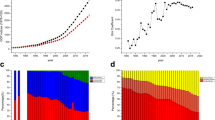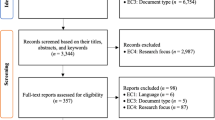Abstract
The study investigated gender differences among 11,000 Israeli children in Grades 4–6 with respect to verbal, spatial, and mathematical ability, as measured by 12 intelligence tests. Consistent differences in score variance were found across grades for 11 of the 12 tests. In each of these tests the variance for boys exceeded that for girls by 10%–20%. With respect to mean achievement, consistent cross-grade differences were found only for mathematical ability, where boys had the edge (about 0.20 SD). These findings diverge from those of recent American studies, which found no gender differences in any of these realms. Furthermore, they differ from the results of earlier Israeli studies in that the gender gap is limited to mathematical ability, and its size is much smaller. The revealed gender gap can be partially attributed to differences in response strategy: girls were found to be more likely to skip items for which they lack an answer (i.e., to take fewer risks in guessing). This implies that the performance of girls on intelligence tests will improve if they are encouraged to dare to guess.
Similar content being viewed by others
References
Benbow, C. P., & Stanley, J. C. (1980). Sex differences in mathematics ability: Fact or artifact?Science, 210, 1262–1264.
Benbow, C. P., and Stanley, J. C. (1982). Consequences in high school and college of sex differences in mathematical reasoning ability: A longitudinal perspective.American Educational Research Journal, 19, 598–622.
Benbow, C. P., and Stanley, J. C. (1983). Sex differences in mathematical reasoning ability: More facts.Science, 222, 1029–1031.
Ben-Shakhar, G., & Sinai, Y. (1991). Gender differences in multiple-choice tests: The role of differential guessing tendencies.Journal of Educational Measurement, 28, 23–35.
Born, M. P., Bleichrodt, N., & Van Der Flier, H. (1987). Cross-cultural comparisons of sex-related differences in intelligence tests: A meta-analysis.Journal of Cross-cultural Psychology, 18, 283–314.
Cahan, S., & Cohen, N. (1989). Age versus schooling effects on intelligence development.Child Development, 60, 1239–1249.
Cahan, S., Hazani, J., Wolf, N., Peyser, M., & Shimborsky, G. (in press). WISC-R95, New Israeli norms for the Wechsler Intelligence Scale for Children. Jerusalem: Psychological Service of the Israeli Ministry of Education (Hebrew).
Cattell, R. B., & Cattell, A. K. S. (1965).Culture fair intelligence test: Scale 2. Champaign, IL: Institute for Personality and Ability Testing.
Cohen, J. (1969).Statistical power analysis for the behavioral sciences. New York: Academic Press.
Cohen, N. (in preparation).The effects of chronological age and schooling experience on IQ scores. Ph.D dissertation, the Hebrew University of Jerusalem.
Cole, N. S. (1990, April).Gender differences and admission policies: Implications for test use. Paper presented at the annual meeting of the American Educational Research Association.
Doolittle, A. E., & Cleary, T. A. (1987). Gender-based differential item performance in mathematics achievement items.Journal of Educational Measurement, 24, 2, 157–166.
Feingold, A. (1988). Cognitive gender differences are disappearing.American Psychologist, 43, 95–103.
Feingold, A. (1992). Sex differences in variability in intellectual abilities: A new look at an old controversy.Review of Educational Research, 62, 61–82.
Feingold, A. (1994). Gender differences in variability in intellectual abilities: A cross-cultural perspective.Sex Roles, 30, 81–92.
Friedman, L. (1989). Mathematics and the gender gap: A meta-analysis of recent studies on sex differences in mathematical tasks.Review of Educational Research, 59, 2, 185–213.
Gafni, N. (1978). The relation between ethnic origin, social class and gender in the level and structure of intelligence. Master's thesis, the Hebrew University of Jerusalem (Hebrew).
Gafni, N., & Melamed, A. (1990).Differential tendencies to guess as a function of gender, test language and test date. Report No. 115. Jerusalem: National Center for Testing and Evaluation (Hebrew).
Halpern, D. F. (1989). The disappearance of cognitive gender differences: What you see depends on where you look.American Psychologist, 44, 1156–1158.
Hyde, J. S. (1981). How large are cognitive differences? A meta-analysis using omega2 and d.American Psychologist, 36, 892–901.
Hyde, J. S., & Linn, M. C. (1988). Gender differences in verbal ability: A meta-analysis.Psychological Bulletin, 104, 1, 53–69.
Hyde, J. S., Fennema, E., & Lamon, S. J. (1990). Gender differences in mathematics performance: A meta-analysis.Psychological Bulletin, 107, 139–155.
Jacklin, C. N. (1989). Female and male: Issues of gender.American Psychologist, 44, 2, 127–133.
Lieblich, A. (1983). The structure of IQ among ethnic groups and minorities in Israel. In: M. Nisan & U. Last (Eds.),Education and psychology. Jerusalem: School of Education, the Hebrew University (Hebrew).
Lieblich, A., Ninio, A., & Ben-Shachar-Segev, N. (1976).WISC-R: Manual to the School-Age Hebrew Version of the Wechsler Intelligence Test. Jerusalem: Institute for Developmental Psychology, the Hebrew University & The Psychological and Counseling Services, Ministry of Education and Culture (Hebrew).
Linn, M. C., & Hyde, J. S. (1989). Gender, mathematics, and science.Educational Researcher, 18, 17–27.
Linn, M. C., & Petersen, A. (1985). Emergence and characterization of sex differences in spatial ability: A meta-analysis.Child Development, 56, 1479–1498.
Maccoby, E. E., & Jacklin, C. N. (1974).The psychology of sex differences. Stanford, CA: Stanford University Press.
Nevo, B. (1986).Gender differences in level on university entrance examinations. Lecture delivered at the National Council for the Advancement of Women, Jerusalem (Hebrew).
Olson, J. F., & Fennesy, L. (1990).An investigation of gender differences due to test-taking instructions. Paper presented at the annual meeting of the American Educational Research Association, Boston.
Ortar, G., & Shachor, A. (1980).Milta: Test battery for ages 9–18. Jerusalem: Ministry of Education and Culture (Hebrew).
Raven, J. C., Court, J. H., & Raven, J. (1975).Manual for Raven's Progressive Matrices and Vocabulary Scales. London: Lewis.
Rosenthal, R., & Rubin, D. B. (1982). Further meta-analytic procedures for assessing cognitive gender differences.Journal of Educational Psychology, 74, 708–712.
Thorndike, R. L., & Hagen, E. (1971).Cognitive abilities test: Form 1, Levels A-H, Grades 3–12. Boston: Houghton Mifflin.
Zeidner, M. (1986). Sex differences in scholastic aptitude: The Israeli scene.Personality & Individual Differences, 6, 847–852.
Zohar, A. (1990).Mathematical reasoning ability: Its structure and selected aspects of its genetic inheritance. Ph.D dissertation, the Hebrew University of Jerusalem (Hebrew).
Author information
Authors and Affiliations
Additional information
This research was supported by the Henrietta Szold Research Institute. We thank Nora Cohen for providing the data base; Lavee Artman, Kalman Binyamini, Nora Cohen, Eyal Gamliel, and two anonymous reviewers for their helpful comments on previous drafts; and Helene Hogri for the editorial revisions.
Rights and permissions
About this article
Cite this article
Cahan, S., Ganor, Y. Cognitive gender differences among Israeli children. Sex Roles 32, 469–484 (1995). https://doi.org/10.1007/BF01544183
Issue Date:
DOI: https://doi.org/10.1007/BF01544183




